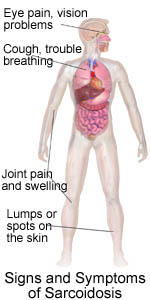
WHAT IS SARCOIDOSIS?

Sarcoidosis is a chronic disease that affects multiple systems in the body, from the eyes to the lungs to the brain. It is characterized by the buildup of immune system cells in organs that form small clusters called granulomas, a type of inflammation of the involved tissues.
Sarcoidosis is found throughout the world. While the disease can affect anybody, young women of African descent and people of Scandinavian, German, Irish, or Puerto Rican origin are more prone to sarcoidosis. It occurs most commonly between the ages of 20 and 40, although it can occur in children and older adults.
Because the symptoms of sarcoidosis can be vague and may be mistaken for other diseases, it’s difficult to estimate how common it is. In the U.S., an estimated 10 to 40 in 100,000 people have sarcoidosis. Among African-Americans, the rate is higher. Sarcoidosis is not cancer; nor is it contagious. Although it can occur in families, it is not inherited. Usually the disease is not disabling; most people with sarcoidosis live normal lives. In fact, in the majority of cases, the disease appears only briefly and disappears on its own. About 20% to 30% of people with sarcoidosis are left with some permanent lung damage, and in 10% to 15% of patients the disease is chronic. Although it is rare, death from sarcoidosis can occur if the disease causes serious damage to vital organs, such as the brain, lungs, or heart.
WHAT CAUSES SARCOIDOSIS?
Researchers believe sarcoidosis is associated with an abnormal immune system response, but what triggers this response is not known. Nor do doctors know whether heredity, environment, or lifestyle affects the development, severity, or length of the disease.
content provided via www.WebMD.com
